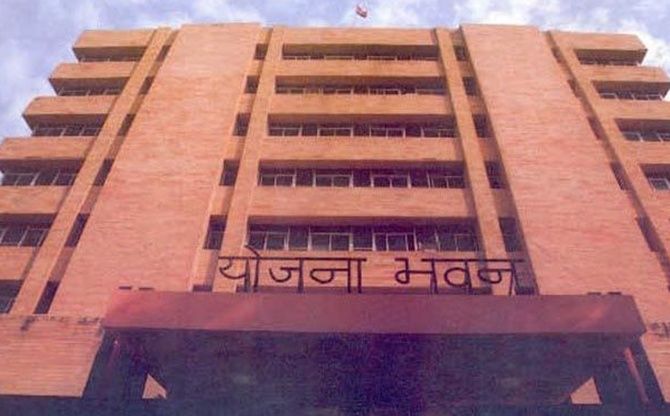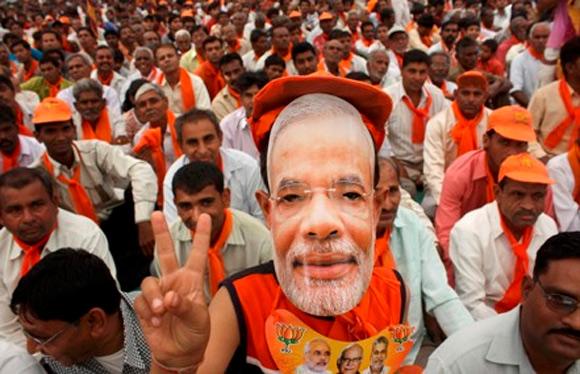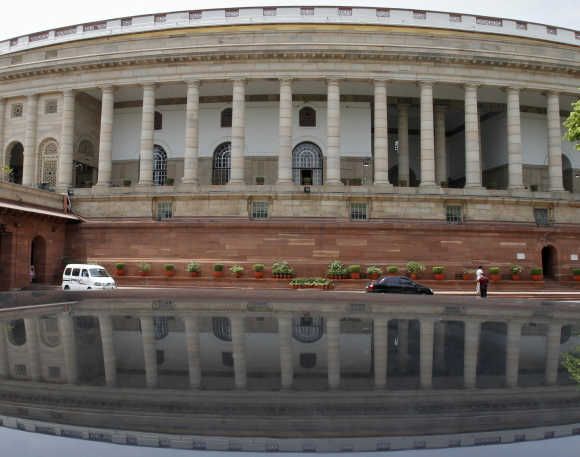The Plan Panel was set up by a simple government resolution in March 1950 had withstood many political and economic upheavals.

It has commissioned 12 five-year plans and six annual plans involving fund outlays of over Rs 200 lakh crore in its 65-year-history, but the fabled Planning Commission is itself set to be history as the government gears up to replace it with a new-age institution in the new year.
The Plan Panel, as it is commonly known as, was set up by a simple government resolution in March 1950 and has withstood many political and economic upheavals, as also some occasional controversies, including those related to its poverty estimates as also about a huge toilet renovation bill and foreign tour expenses of its last Deputy Chairman.
It was a decisive mandate for a change of government during a politically and economically supercharged 2014 that finally led to its epitaph being written.

Photograph: Reuters
Prime Minister Narendra Modi announced in his first Independence Day speech this August that the Commission would get a replacement, while speculation is rife that the name and structure of the new body may be revealed on the Republic Day next month.
In the process, most of the work at Yojana Bhavan, a few blocks away from the Parliament, continues to revolve around the consultation and other procedures related to the setting up of the new institution, which the government wants to create as a more practical symbol of 'cooperative federalism'.

Experts and insiders say 2014 would certainly be one of the most important years in the history of Planning Commission, for not just being the last year of its existence, but also for being a period when this socialist-era institution had to struggle for a makeover to remain relevant in a market-driven economy.
While it went through numerous operational makeovers over the years of its existence, ranging from being a simple planning body to a powerful 'control-commission' to a fiscal decentralisation instrument to an official think-tank, the voices had begun to grow louder for an overhaul even before the new government took charge in May 2014.
The defeat of the last UPA government, however, led to immediate resignation of the Commission's Deputy Chairman, Montek Singh Ahluwalia, who was at the helm of affairs for a decade, and other members in the last week of May.

Immediately thereafter, rumours began surfacing on the possible names of persons to head the Panel and continued till the big announcement was made by the Prime Minister, who happens to be the Chairman of the Commission, on August 15 about the end of the road for Yojana Ayog.
Subsequently, a consultation process was launched for suggestions on the structure and role of the new body, while a lot many names, including the widely reported 'Niti Ayog' or Policy Commission have also come up in the public domain.
There is no official word as yet on the final structure, role or name of the new body.
It has been suggested that instead of a "control Commission", the new body should play the role of a catalyst and provide a platform to the Centre, states and experts to discuss issues and come out with the best solutions.
To take Chief Ministers on board, Modi also called a meeting earlier this month to deliberate on the structure of the new body, where most state leaders were said to be in favour of decentralisation of power and planning through it.
Congress-ruled states, however, had reservations about dismantling an institution which was set up by the first Prime Minister Jawaharlal Nehru and they suggested restructuring of the existing body, rather than a complete replacement.
Incidentally, Nehru himself is said to have faced resistance to the idea of setting up of the Planning Commission, but it went on to become a major platform for successive governments to formulate and push forward economic policies and other development plans.
It was set up initially as part of the government's declared objectives to promote a rapid rise in the standard of living of the people by efficient exploitation of resources, increasing production and offering employment opportunities.
The Commission was charged with the responsibility of assessing all resources of the country, augmenting deficient resources, formulating plans for the most effective and balanced utilisation of resources and determining priorities.

The first Five-year Plan was launched in 1951 with total outlay of little over Rs 2,000 crore (Rs 20 billion) and two subsequent five-year plans were formulated till 1965, when there was a break because of the Indo-Pakistan Conflict.
Two successive years of drought, devaluation of currency, a general rise in prices and erosion of resources disrupted the planning process and after three Annual Plans between 1966 and 1969, the fourth Five-year plan was started in 1969.
The Eighth Plan could not take off in 1990 due to the fast changing political situation at the Centre and the years 1990-91 and 1991-92 were treated as Annual Plans. The Eighth Plan was finally launched in 1992.
For the first eight Plans, the emphasis was on a growing public sector with massive investments in basic and heavy industries, but since the launch of the 9th Plan in 1997, the emphasis on the public sector has become less pronounced and the current thinking on planning in the country, in general, is that it should increasingly be of an indicative nature.
The New Year 2015 would again be keenly awaited by the experts to witness what replaces this long-standing structure and what changes does it bring to the way plans and policies are formulated and implemented by the new government.









